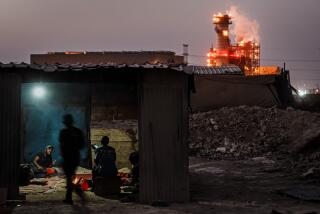Touched by History : Iraq’s invasion of Kuwait has jolted families, jobs and hopes. : AMMAN, JORDAN : Banker Descends Into the Nether World of a Jordanian Refugee Camp
- Share via
Once, what seems like a long time ago, Hisham Alish worked every day in the predictable and air-conditioned routine of an Amman bank. The memory seems alien to him now, the experience of another being, as distant from his present life as regular hours and filling lunches.
Every morning for the last few weeks, Alish, 41, has donned his banker’s tie and blue blazer to labor in a dazzling and distressing nether world he never imagined existed when summer began.
He is one of the volunteer coordinators of a teeming transit camp for about 15,000 Asian refugees from Kuwait that is being operated by Jordanian charities with U.N. help on the site of an industrial fairgrounds in an Amman suburb.
Alish’s salary is still paid by the Jordan Islamic Bank, but everything else is different. It is more than just the fact that he skips lunch because it is discomfiting to eat among so many hungry people. His unexpected new job has taught Alish something about life, the world--and himself, he says.
“I have always believed that people should do something for their country. Now I feel almost like a soldier,” he said.
The camp that Alish helps to administer is an instructive, demanding place.
“It is easy when you do not feel well to call your bank and say you need some time off. Now, I work twice as many hours here, but even (when) I am tired and out of sorts I know that I must come,” Alish said.
About half of the refugees awaiting repatriation are Bangladeshis who worked at the bottom end of the Kuwaiti economy, earning, nevertheless, more in a month than they could reasonably hope for in a year at home.
“Friends come from the bank to see me. They are as astonished as I at all of this. I never realized, for example, that there are only relatively few Kuwaitis and that foreigners ran their country,” Alish said. “These people have fled because they are afraid there will be war, but they care nothing for politics. They complain because they lost a chance to earn money and they know that things will be difficult for them economically when they reach home.”
The education of Hisham Alish has just begun. Repatriation of the refugees is painfully slow. The camp will be in business for a long time. It does not dismay him.
“I am doing something that I need to do. I will see it through.”
More to Read
Sign up for Essential California
The most important California stories and recommendations in your inbox every morning.
You may occasionally receive promotional content from the Los Angeles Times.










